Mathematical Physics Studies
Series Editors
Giuseppe Dito
Dijon, France
Edward Frenkel
Berkeley, CA, USA
Sergei Gukov
Pasadena, CA, USA
Yasuyuki Kawahigashi
Tokyo, Japan
Maxim Kontsevich
Bures-sur-Yvette, France
Nicolaas P. Landsman
Nijmegen, Gelderland, The Netherlands
Bruno Nachtergaele
Davis, CA, USA
The series publishes original research monographs on contemporary mathematical physics. The focus is on important recent developments at the interface of Mathematics, and Mathematical and Theoretical Physics. These will include, but are not restricted to: application of algebraic geometry, D-modules and symplectic geometry, category theory, number theory, low-dimensional topology, mirror symmetry, string theory, quantum field theory, noncommutative geometry, operator algebras, functional analysis, spectral theory, and probability theory.
More information about this series at http://www.springer.com/series/6316
Fumio Hiai
Quantum f-Divergences in von Neumann Algebras
Reversibility of Quantum Operations
1st ed. 2021

Logo of the publisher
Fumio Hiai
Abiko, Chiba, Japan
ISSN 0921-3767 e-ISSN 2352-3905
Mathematical Physics Studies
ISBN 978-981-33-4198-2 e-ISBN 978-981-33-4199-9
https://doi.org/10.1007/978-981-33-4199-9
The Editor(s) (if applicable) and The Author(s), under exclusive license to Springer Nature Singapore Pte Ltd. 2021
This work is subject to copyright. All rights are solely and exclusively licensed by the Publisher, whether the whole or part of the material is concerned, specifically the rights of translation, reprinting, reuse of illustrations, recitation, broadcasting, reproduction on microfilms or in any other physical way, and transmission or information storage and retrieval, electronic adaptation, computer software, or by similar or dissimilar methodology now known or hereafter developed.
The use of general descriptive names, registered names, trademarks, service marks, etc. in this publication does not imply, even in the absence of a specific statement, that such names are exempt from the relevant protective laws and regulations and therefore free for general use.
The publisher, the authors and the editors are safe to assume that the advice and information in this book are believed to be true and accurate at the date of publication. Neither the publisher nor the authors or the editors give a warranty, expressed or implied, with respect to the material contained herein or for any errors or omissions that may have been made. The publisher remains neutral with regard to jurisdictional claims in published maps and institutional affiliations.
This Springer imprint is published by the registered company Springer Nature Singapore Pte Ltd.
The registered company address is: 152 Beach Road, #21-01/04 Gateway East, Singapore 189721, Singapore
To the memory of Dnes Petz (19532018)
Preface
After I wrote in 1981 the joint paper [60] with M. Tsukada and M. Ohya on sufficiency of von Neumann subalgebras and the relative entropy in a specialized situation, I wanted to extend the sufficiency notion to general von Neumann subalgebras. But I felt some difficulty in doing that because of the lack of the conditional expectation onto a general von Neumann subalgebra. In the meantime, I was shocked by D. Petz remarkable paper [105] in 1986, where he settled the problem mentioned above by making use of the generalized conditional expectation due to L. Accardi and C. Cecchini [1] in 1982. In his 1988 paper [106] Petz followed the same idea to introduce the notion of sufficient (or reversible) channels (more precisely, unital normal 2-positive maps) between von Neumann algebras, and he further collaborated with A. Jenov on the subject in [68, 69].
After the joint work of the 2011 paper [62], I thought that it would be nice to extend the materials for [62] to the von Neumann algebra setting, including a renewal of Petz theory on sufficiency and reversibility in von Neumann algebras. But that was not undertaken due to my laziness before I looked at the papers [20, 66], where the sandwiched Rnyi divergence, a new Rnyi divergence extensively developed in recent years, was extended to the von Neumann algebra setting. Those papers strongly motivated me to develop a general theory of quantum f-divergences in von Neumann algebras with applications to the sufficiency and reversibility problem. I planned to first write three papers on three different types of f-divergences (the standard f-divergences, the maximal f-divergences, and the measured f-divergences) in von Neumann algebras. The first two papers were published in [53, 54], which are surveyed in Chaps. , the main part of the monograph, I revisit the work [68, 105, 106, 108] with slight extensions and some modifications.
Acknowledgments
I would like to thank Miln Mosonyi, Anna Jenov, and Hideki Kosaki. I greatly enjoyed joint work with Mosonyi in [57, 62]. Many results and proofs in this monograph are modeled on those in [57, 62] in the finite-dimensional case. I thank Mosonyi also for inviting me to lectures for an intensive course [55] in April 2019 at the Department of Mathematical Analysis, Budapest University of Technology and Economics. Appendix A of this monograph is a short extract from those lecture notes. I learned from Jenov (as [65]) important points in Sects. , in particular, I am grateful to her for permitting me to include Lemma 3.5, which is due to her. Discussions with Kosaki in recent joint work [56] on operator connections of unbounded positive operators and positive forms were helpful in writing Appendix D.
I am grateful to Masayuki Nakamura (Springer Japan) for his constant support, without which it would not have been possible for me to write this monograph.
This work was supported in part by JSPS KAKENHI Grant Number JP17K05266.
Fumio Hiai
Chiba, Japan
October 2020
Contents
The Author(s), under exclusive license to Springer Nature Singapore Pte Ltd. 2021
F. Hiai Quantum f-Divergences in von Neumann Algebras Mathematical Physics Studies https://doi.org/10.1007/978-981-33-4199-9_1
1. Introduction
The notion of quantum divergences has played a significant role in quantum information, which defines important quantum quantities to discriminate between states of a quantum system. A quantum system is mathematically described, in most cases, by an operator algebra  on a Hilbert space, either finite-dimensional or infinite-dimensional, and a quantum divergence is generally given as a function S() of two states or more generally, two positive linear functionals and on
on a Hilbert space, either finite-dimensional or infinite-dimensional, and a quantum divergence is generally given as a function S() of two states or more generally, two positive linear functionals and on 

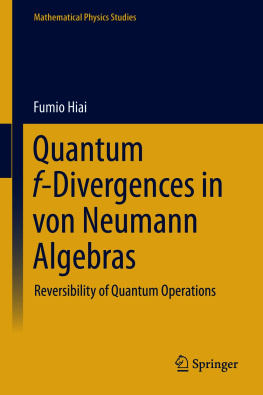
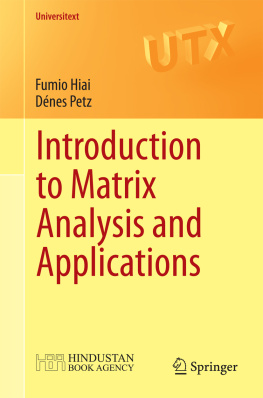
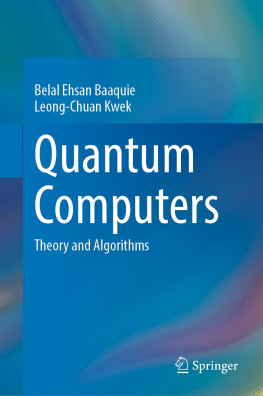
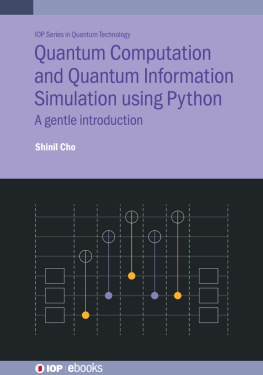
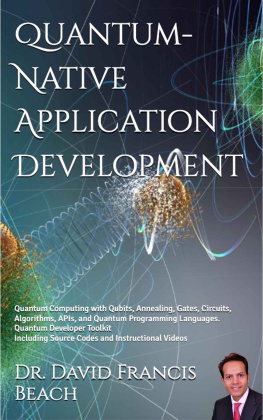
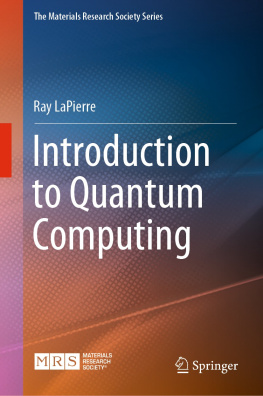

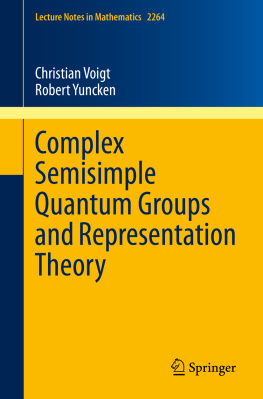
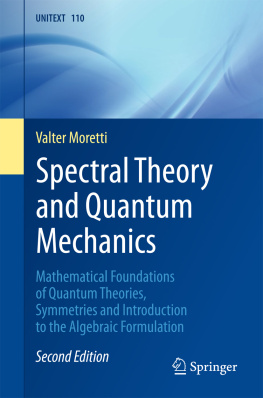
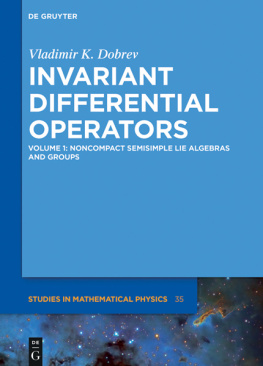

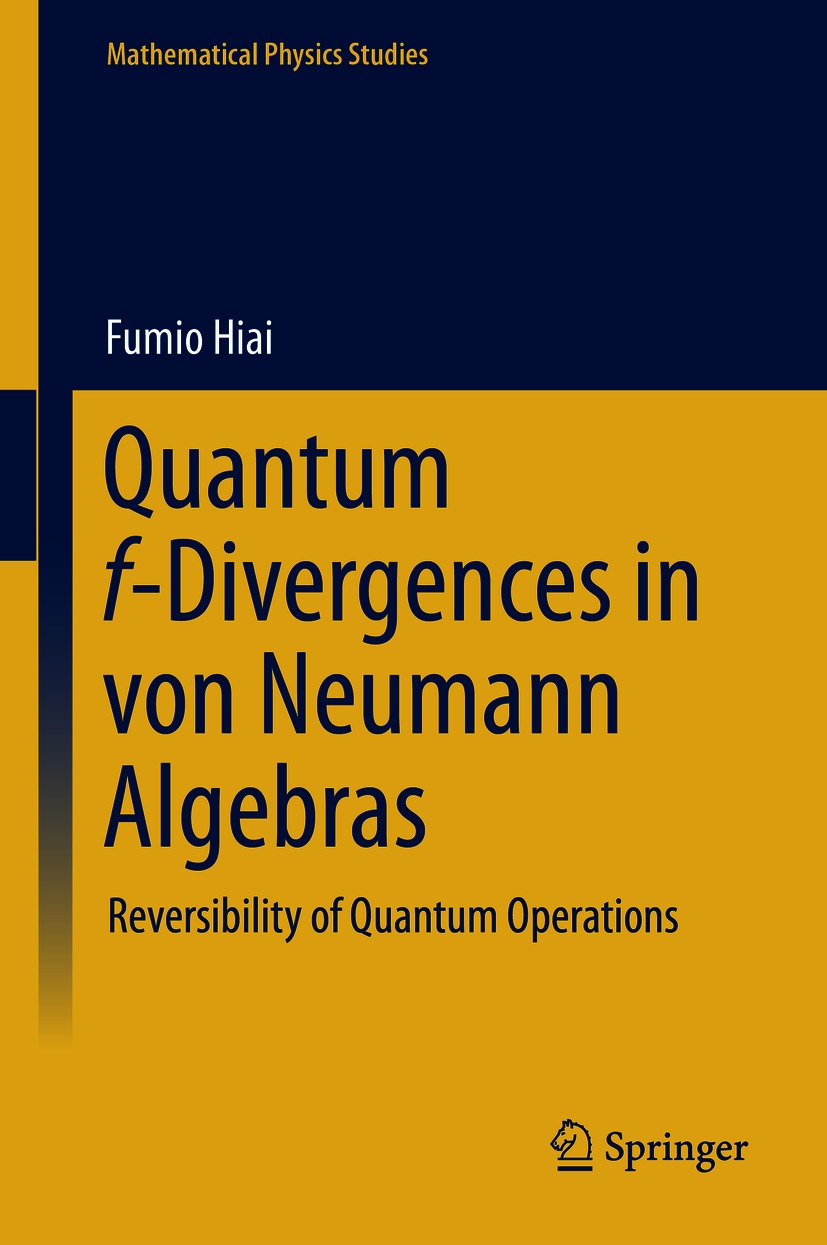

 on a Hilbert space, either finite-dimensional or infinite-dimensional, and a quantum divergence is generally given as a function S() of two states or more generally, two positive linear functionals and on
on a Hilbert space, either finite-dimensional or infinite-dimensional, and a quantum divergence is generally given as a function S() of two states or more generally, two positive linear functionals and on 